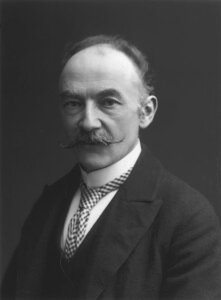Books By Thomas Hardy
- Desperate Remedies (1871) – standalone
- Under the Greenwood Tree (1872) – standalone
- A Pair of Blue Eyes (1873) – standalone
- Far from the Madding Crowd (1874) – standalone
- The Hand of Ethelberta (1876) – standalone
- The Return of the Native (1878) – standalone
- The Trumpet-Major (1880) – standalone
- A Laodicean (1881) – standalone
- Two on a Tower (1882) – standalone
- The Mayor of Casterbridge (1886) – standalone
- The Woodlanders (1887) – standalone
- Wessex Tales (1888) – standalone
- Tess of the d’Urbervilles (1891) – standalone
- Life’s Little Ironies (1894) – standalone
- Jude the Obscure (1895) – standalone
About Thomas Hardy
 Thomas Hardy, born on June 2, 1840, in Higher Bockhampton, Dorset, England, was a renowned English novelist and poet whose works vividly depicted the rural life of Victorian England. Hardy’s novels and poetry are celebrated for their richly drawn characters, evocative settings, and penetrating explorations of human nature, fate, and the inexorable forces of destiny.
Thomas Hardy, born on June 2, 1840, in Higher Bockhampton, Dorset, England, was a renowned English novelist and poet whose works vividly depicted the rural life of Victorian England. Hardy’s novels and poetry are celebrated for their richly drawn characters, evocative settings, and penetrating explorations of human nature, fate, and the inexorable forces of destiny.
Growing up in rural Dorset, Hardy developed a deep connection to the natural world and the landscapes of his childhood, which would later become a central theme in his writing. Despite his humble beginnings, Hardy’s keen intellect and passion for literature led him to pursue a career as a writer, defying the expectations of his family and society.
Hardy’s literary career began with the publication of his first novel, “Desperate Remedies,” in 1871, followed by a string of successful novels including “Far from the Madding Crowd” (1874), “The Mayor of Casterbridge” (1886), and “Tess of the d’Urbervilles” (1891). These works, set against the backdrop of the fictional Wessex countryside, captured the rhythms and rituals of rural life while probing the complexities of human relationships and societal norms.
In addition to his novels, Hardy was also a prolific poet, publishing several volumes of verse throughout his lifetime. His poetry, often characterized by its lyrical beauty and melancholic tone, explored themes of love, loss, and the passage of time, earning him recognition as one of the greatest poets of the Victorian era.
Despite achieving literary success, Hardy faced controversy and criticism for the boldness of his themes and the frankness of his portrayal of society. His novel “Jude the Obscure” (1895), in particular, sparked outrage for its depiction of sexuality and social mores, leading Hardy to eventually abandon novel writing in favor of poetry.
Thomas Hardy’s enduring legacy as a writer lies in his ability to capture the essence of the human experience with honesty, compassion, and insight. His works continue to resonate with readers around the world, inspiring generations of writers and readers alike with their timeless exploration of the human condition.
Hardy passed away on January 11, 1928, but his literary legacy lives on, ensuring that his contributions to English literature are remembered and cherished for generations to come.

